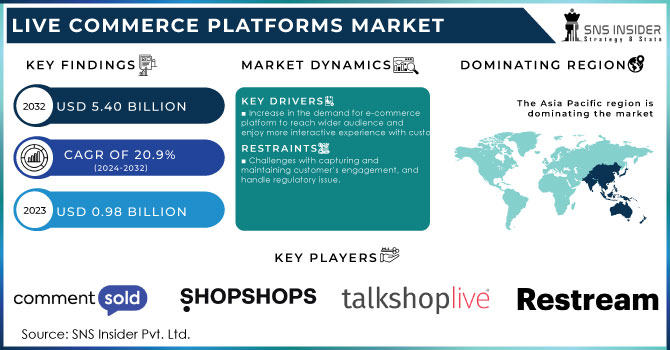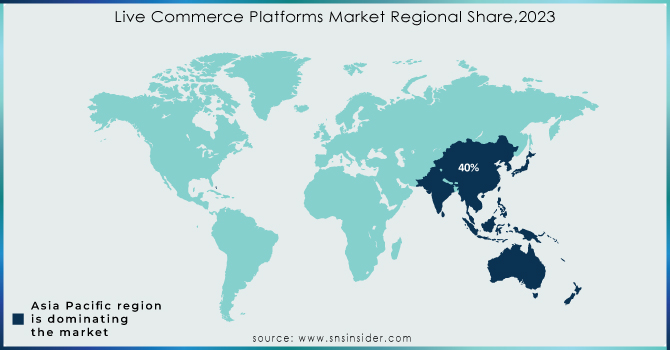Live Commerce Platforms Market Report, Scope & Overview:

Get More Information on Live Commerce Platforms Market- Request Sample Report
The Live Commerce Platforms Market size was valued at USD 0.98 billion in 2023 & is estimated to surpass USD 5.40 billion by 2032 with a compound annual growth rate of 20.9 % over the forecast period 2024-2032.
The changing trend of customers towards digital shopping, more personalized buying, and easy and efficient payment options, with the adoption of technology and innovation in the business, are the major factors that driving the Live Commerce market. The growing digitization in the business, such as live Fashion shows, online customization markets, live shopping, etc. has given the market, a new way to develop. China is the first country, among the other competitors to gain success in the Live commerce platforms market since 2020, and after the pandemic, they had taken a strong step to rise by combining e-commerce with entertainment. In 2023, the China online streaming E-commerce had earned revenue of more than 45 Trillion Yaun, as people of China spent lots of their time on the e-commerce platform, making videos and connecting people with entertainment as well as selling products, along with the Chinese e-commerce apps are customized according to the customer’s mindset, and people using one app for multiple functions, such as WeChat is used by people for chatting as well as posting product videos for selling.
The development of various online commerce platforms that is trending among the customers, starting from social-media online shopping to other platforms are Facebook, Instagram, Amazon, Alibaba, Shopify, Shopshops, etc. The market study on social media users, who are watching online shopping, the large no. people are targeted in Asia and Indonesia. Facebook has shown the surge in online shopping through social media users with more than 55%, among others. In Addition, Amazon, eBay, AliExpress are the most vising e-commerce Platform, with the most sales are generated by amazon is more than 35%.
Virtual try-ons, product visualisation, interactive product demos, and in-store navigation aids can all serve to increase user engagement through the use of augmented AR/VR for virtual try-ons, AI-enabled personalised suggestions such as Chatbot, Virtual Assistants (for customers support), and creative interactive elements.Safe internet transactions are also essential to real-time commerce. According to study conducted by the KTH Royal Institute of Technology in Sweden and based on Google's ARCore data, more than 40% of the AR mobile market is currently using mobile AR.
Moreover, with on–going e-commerce self-built platform, content community and traditional social Platform are also shifting the people mindset towards the digitalization. According to study on the content community commerce, 70% of the investment done in this market, as around 80% people on an average buy product based on the reviews of the product.
Market Dynamics
Drivers
-
Increase in the demand for e-commerce platform to reach wider audience and enjoy more interactive experience with customers.
With the rise of affordable internet access, the real-time trading market is a rapidly growing segment of the broader e-commerce industry.Key factors include the rise of social commerce, widespread use of the internet and smartphones, and the growing popularity of social media platforms. The market is also driven by the development of digital technology, influencer marketing, which has accelerated the adoption of online shopping. The Indian government has taken several initiatives to promote e-commerce, such as launching the Digital India program and raising the FDI limit in e-commerce. As like same, in U.S., SBA (small business administration) providing grants to small Business for development, and National Telecommunication and Information Administration (NTIA), a broadband programme, provide internet service to underserved areas to promote e-commerce platform.
Live commerce also enables businesses to create more interactive and engaging shopping experiences with features such as live demos, tutorials and QandA sessions, resulting in higher conversion rates and increased brand appeal.
Restraints
-
Challenges with capturing and maintaining customer’s engagement, and handle regulatory issue.
The online market is booming day-by-day and lots of competitors are evolving daily with their new product and brands along with creative ads which distract the customer’s preference towards their product. The loyal customers of any product or brand also seen shifted towards that, which hampers the market engagement with customers. Also the registration and legal compliances with launching new product to market , needs copyright and trademark, etc. Consume lots of money and time that can be the restraint factor for market growth.
Key Segmentation
By category
Because live commerce offers attractive features and is interactive, the apparel & fashion category sector led the market in 2023, accounting for more than 40 % of the total market share. Collaborations with industry insiders and fashion influencers greatly expanded the audience and affect the live commerce events. In June 2021, the China Internet Network Information Center (CNNIC) released a report stating that there were more than one billion influencers in China. The popularity and reliability of influencers has also drawn the larger audience towards the market and improve the brands perspective. According to the market study on the revenue generated by fashion business through e-commerce is seen to be around $ 400- 500 Million in 2023.
The day-to-day changing fashion trends, with customer’s preference, cultural and social factors with the maintaining sustainability had given the appeal and fashion market to customize the market accordingly. For Instance, the manufacturing of the organic Cotton clothing, bags made up of wood pulp, jewellery made from Bamboo, are some that had established the online platform at next level.
Regional Analysis
Asia Pacific led the market with more than 40% of the revenue share in 2023. Various other factors have been contributing to the expansion of live e-commerce market. The region demonstrated a high internet penetration rate and wide smartphone adoption, generating many potential clients through social media and other online trading and entertainment platforms. As social media has become a more central part of daily life, they have evolved into almost direct pipelines for live commerce platforms online. Furthermore, shoppers in the country want a more convenient or entertaining shopping experience, something that live commerce models do quite well. The major leading country of the Asia-pacific, “China” is the leader of the B2B business and had marked its presence of more than 75% in the e-commerce market, with large customer’s interaction and also by establishing many small retail- online businesses. Also the adoption of the AI such as augmented reality (AR) and virtual Reality (VR), has enhanced the shopping experience with customers.

Need any customization research on Live Commerce Platforms Market - Enquiry Now
Key Players
The major key players are CommentSold, GhostRetail, Inc., Firework, ShopShops, TalkShopLive, Restream, Inc., Bambuser AB, Livescale, giosg.com Ltd., Klarna Bank AB (publ), Taobao, Jingdong, Suning, Pinduoduo, Douyin, Kuaishou, Xiaohongshu, Bilibili, Weibo, WeChat, Amazon, and others.
Recent Developments
-
Flipkart has signed MoU with IIT Delhi, and partnership with Foundation for Innovation and Technology Transfer (FITT), to address the Industry’s problem and maintain the customers engagement, by research of the graphs and data of the market.
-
TikTok Bambuser AB announced in February 2023 a partnership with Tiktok to offer its sellers an enhanced, more consumer-friendly livestream shopping experience in the U.S. market by connecting their streams directly intothe cessader's product listings on shoppable profile pages hosted within the shop tab.
| Report Attributes | Details |
|---|---|
| Market Size in 2023 | US$ 0.98 billion |
| Market Size by 2032 | US$ 5.40 Billion |
| CAGR | CAGR of 20.9 % From 2024 to 2032 |
| Base Year | 2023 |
| Forecast Period | 2024-2032 |
| Historical Data | 2020-2022 |
| Report Scope & Coverage | Market Size, Segments Analysis, Competitive Landscape, Regional Analysis, DROC & SWOT Analysis, Forecast Outlook |
| Key Segments | • By category (Cosmetics & Personal Care, Apparel & Fashion, Consumer Electronics, Furnishing, Entertainment, Others) |
| Regional Analysis/Coverage | North America (US, Canada, Mexico), Europe (Eastern Europe [Poland, Romania, Hungary, Turkey, Rest of Eastern Europe] Western Europe [Germany, France, UK, Italy, Spain, Netherlands, Switzerland, Austria, Rest of Western Europe]), Asia Pacific (China, India, Japan, South Korea, Vietnam, Singapore, Australia, Rest of Asia Pacific), Middle East & Africa (Middle East [UAE, Egypt, Saudi Arabia, Qatar, Rest of Middle East], Africa [Nigeria, South Africa, Rest of Africa], Latin America (Brazil, Argentina, Colombia, Rest of Latin America) |
| Company Profiles | CommentSold, GhostRetail, Inc., Firework, ShopShops, TalkShopLive, Restream, Inc., Bambuser AB, Livescale, giosg.com Ltd., Klarna Bank AB (publ), Taobao, Jingdong, Suning, Pinduoduo, Douyin, Kuaishou, Xiaohongshu, Bilibili, Weibo, WeChat, Amazon |
| Key Drivers | • Increase in the demand for e-commerce platform to reach wider audience and enjoy more interactive experience with customers. |
| RESTRAINTS | • Challenges with capturing and maintaining customer’s engagement, and handle regulatory issue. |

